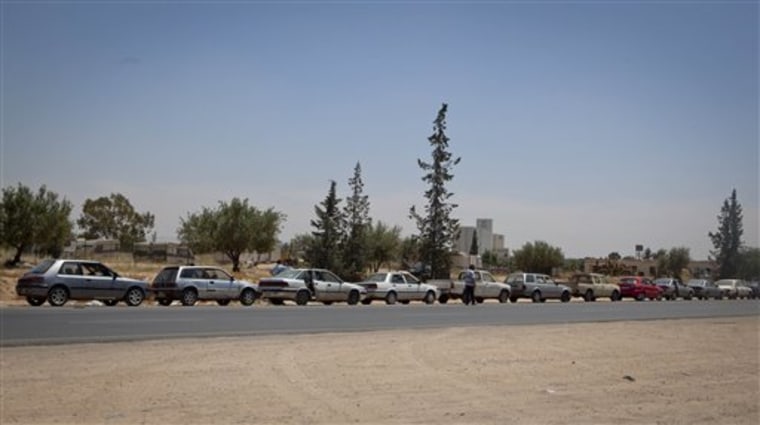Cars sat abandoned in miles-long fuel lines, motorists traded angry screams with soldiers guarding gas stations, and many shops were closed Sunday on what should have been a work day.
In ever-multiplying ways, residents in the Libyan capital are feeling the sting of shortages from uprising-related disruptions of supplies.
The shortages are a dramatic sign of how Libya's nearly 3-month-old rebellion — and the resulting chaos — is affecting daily life in Moammar Gadhafi's stronghold and other western areas of Libya still under his rule. International sanctions have begun to bite, many supply routes are unstable, and there are shortages of skilled people in some sectors to keep the city running smoothly.
Yet the deprivations — however irksome — pale in comparison to the situation in the port city of Misrata, the only rebel stronghold in western Libya. It has been under siege by land for two months, with hundreds of civilians killed, and Gadhafi's forces are now trying to block access to the port that is Misrata's only lifeline.
In Tripoli, the shortages were obvious, even to Western reporters who may only leave their hotel with a government minder and guard. It is less clear what the eventual impact might be on Gadhafi's ability to rule.
An engineer based in Tripoli said Libyan TV blames the shortages on NATO, which is providing military muscle against Gadhafi, while average residents blame hardships on the regime. The engineer requested anonymity, saying he did not want to provoke the government.
In some ways, the city appeared to be divided into those with government perks and those without.
In an hours-long tour of Tripoli, cars decked with pictures of Gadhafi — his arms raised and streaks of light emerging from behind him — muscled into miles-long lines for gasoline. A minivan carrying Western reporters also pushed in.
A young black-uniformed attendant clutched a thick wad of Libyan currency, suggesting that black market rates for fuel were running far higher than the government's set price of 12 cents (150 dirhams) a liter.
Shortages were apparent in other ways: a few dozen people crowded around a bakery in central Tripoli, unsure if its good were being depleted. A minder said most of the bakers were Egyptian laborers who fled the country as unrest worsened.
One translator for the foreign reporters looked frustrated when, soon after he lit a cigarette, a driver told him to extinguish it and rejoin reporters in their vehicle.
"Do you know how much these cost?" he shot at the driver.
He later explained: a pack of Marlboros — a fancy brand in Libya — now cost six dinars, up from 2.5 dinars before unrest began three months ago.
Though many stores remained shuttered on Sunday, several stores in the picturesque Italian quarter were open, notably the gold shops. But beyond their glittering window displays, they held no wares inside. One store was displaying fake gold, according to the goldsmith who said he kept the authentic goods at home and had no customers in any case.
Along the road linking Tripoli to Libya's western border with Tunisia, long fuel lines were visible in a series of coastal towns. Libyan-plated cars crowded gas stations in two small Tunisian towns close to the border, and a taxi driver there complained that shortages in Libya were driving up the price in Tunisia.
Tunisia's official TAP news agency said Sunday that dozens of shells from fighting in Libya have fallen on Tunisian territory, drawing a new government protest. There were no reported injuries after the shells landed as Libyan troops fought with rebels to regain control of the Wazen-Dhehiba border post.
TAP quoted the Foreign Ministry as warning that Tunisia will take "all measures needed" within the law to ensure protection of its citizens and territory. It didn't elaborate.
In Washington, President Barack Obama's national security adviser, Tom Donilon, discussed Gadhafi's prospects during an interview aired on "Fox News Sunday."
"Gadhafi is still in power today," Donilon said. "We have done the following, though. We have protected civilians who were under threat in Benghazi and other towns in eastern Libya, and we have organized the international community to continue to put the pressure on him. Time will not be on Gadhafi's side."
